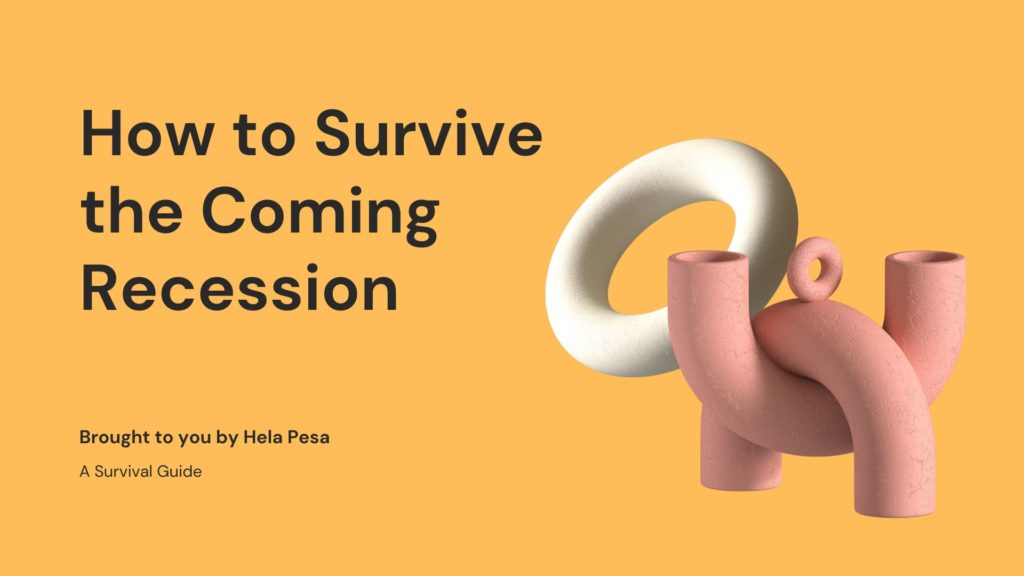According to Statista, Kenyans spent three-quarters of their earnings on food, housing, communication, and transport. This meant the majority of Kenyans are living within their salary with little to spare for saving. When we look at the data further we find more spending on alcohol, clothing, and health. There are little to no savings for most Kenyans.
The majority of people living payslip to payslip is often due to a combination of factors such as:
- Low income: If someone earns a low salary, it can be difficult to save and make ends meet, leading them to rely on each payslip to pay for their expenses. Low income also limits one’s ability to borrow at cheaper rates. Most low-income earners are given loans with high interest which discourages most of them from accessing credit
- High expenses: High living costs, such as housing, healthcare, and education, can make it challenging to save and leave little room for unexpected costs. The current inflation levels are putting pressure on an already weak economy. This has increased the number of people below the poverty line. With stagnant wages, the cost of living is expected to keep going up.
- Debt: High levels of debt, such as credit card debt or student loans, can make it hard to save and put a strain on a person’s finances. This is especially hard when you have debt and you are between jobs forcing you to drain your savings to repay their debts.
- Unexpected events: Emergencies, such as car repairs or medical bills, can also put a strain on a person’s finances and cause them to rely on each paycheck to cover their expenses.
Overall, living paycheck to paycheck can make it difficult to build financial security and prepare for the future and can create stress and financial instability. That is why we have created this guide to help you control your finances to survive these tough times.
1. Make a Budget
Making a budget helps you live from paycheck to paycheck by allowing you to plan and prioritize your expenses. It gives you a clear understanding of your income and expenses, enabling you to make informed financial decisions and avoid overspending. By tracking your spending and setting aside money for necessary expenses, such as bills and savings, you can ensure that your money lasts until your next paycheck and prevent the stress of living paycheck to paycheck. Additionally, a budget can help you identify areas where you can cut back on unnecessary spending and allocate those funds toward reducing debt or building emergency savings.
2. Define your financial goals
Defining your financial goals provides a clear direction and purpose for your money, helping you stay focused and motivated. It helps you prioritize spending, make informed decisions, and avoid distractions or temptations that can lead to overspending and financial stress. Having specific and achievable financial goals, such as paying off debt, building an emergency fund, or saving for a down payment on a home, gives you a road map for how to allocate your resources and make the most of your money.
Having a clear idea of what you want to achieve financially also helps you measure your progress, stay accountable, and make any necessary adjustments along the way. It keeps you on track by providing a sense of purpose and direction and can give you the motivation you need to make the necessary sacrifices or changes to reach your goals. In short, defining your financial goals provides a foundation for making informed financial decisions and helps you stay focused on what truly matters to you.
3. Start cutting cost
Cutting costs can help stop living payslip to payslip by freeing up money in your budget that can be used to pay bills, build an emergency fund, or reduce debt. By reducing expenses, you can increase the amount of money available to cover your essential needs, reducing the stress and uncertainty of living paycheck to paycheck.
Some common cost-cutting strategies include:
- Reducing discretionary spending on non-essential items, such as entertainment, dining out, or shopping
- Shopping for better deals on groceries, utilities, and other household expenses
- Downsizing housing or transportation costs
- Cutting back on subscriptions or memberships that are not essential
- Improving energy efficiency to reduce utility bills
By finding ways to reduce your expenses, you can free up money that can be used to build financial stability and security. This can help you break the cycle of living paycheck to paycheck and give you a sense of control over your finances. It’s important to remember that cost-cutting is a process, and small changes can add up over time to have a big impact on your financial situation.
4. Manage your Debt
One of the most difficult things is getting yourself out of debt while you live payslip to payslip. But it is important that you manage your own debt before you can fully become financially independent. Debt is a good thing when managed well. Like everything you spend your money on, debt has a cost, and it’s this cost you should be keen on understanding. Cheap debt used for investment will take you a long way but if misused it can turn your finances into a catastrophe
some steps to take to improve your debt include
Prioritize debt repayment: Focus on paying off high-interest debt first, such as credit card debt, to reduce the amount of interest you pay over time.
- Increase payments: Make larger payments towards your debt whenever possible. Even small increases can make a significant difference over time.
- Consolidate debt: Consider consolidating your debt into one loan with a lower interest rate to save on interest and simplify your debt repayment process.
- Avoid new debt: Try to avoid taking on new debt while you’re working on paying off existing debt.
- Seek professional help: If you’re having difficulty managing your debt, consider seeking the help of a financial advisor or credit counselor.
Remember, managing debt takes time and effort, but the benefits to your financial health are well worth it. By creating a plan and sticking to it, you can pay off debt and improve your financial status over time.

